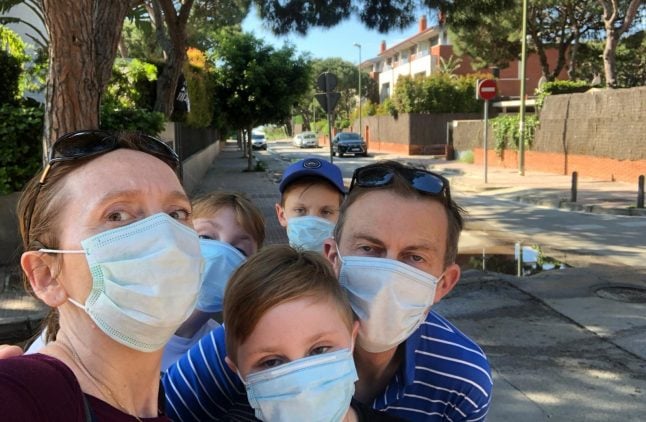Blinking into the bright spring sunshine like creatures who had not seen daylight for ages, we took our first tentative steps back into the real world.
Or should that be the surreal world.
For life was nothing like the last time we had emerged from our house six weeks ago.
Take the way we were dressed for a start. All masked up and nowhere to go.
Still, it was our first day of relative freedom and we were going to cherish it.
Children were allowed back on to the streets for the first time since Spain imposed one of the most drastic lockdowns in the world on March 14th.
Of course, this was not supposed to be some Pied Piper-style rush of millions of children back into the streets.
The Spanish government said only children aged up to 14 could go out between 9am and 9pm and they must be accompanied by just one adult.
Therefore, we had to split up the family when we left the house in order to comply with the governments regulations.
So, despite spending six weeks together, I went off with our eldest, while my wife stayed with the twins.
Under the regulations, playgrounds or sports areas were strictly out of bounds. Walks were permitted for up to one hour from 1km from their homes. Thankfully, scooters, bikes and other toys could be taken out.
READ MORE: What you need to know about Spain's new rules for taking children outside during lockdown
We decided we were not taking any chance so rather self-consciously donned protective masks.
However, despite the warnings from the government that wearing a mask would be advisable but not obligatory, we appeared to be the odd ones out.
Most children seemed to be wandering around as if nothing had happened in the past two months.
No masks and the odd parent chatting with friends at very close quarters.
It was, perhaps, only to be expected after so long cooped up.
Living near the sea meant our first stop had to be the beach, of course. Suddenly, something you almost take for granted felt very precious.
On the short walk to the waves, the striking thing was how nature had had a field day since our last meeting six weeks ago.
The grass had gone mad and grown as tall as our knees.
Heavy rain over the past few days meant the path was flooded but our three boys took delight in the simple pleasure of wading through the water, something they had not done since they were toddlers.
The beach was sealed off with a police cordon but this was ignored by many parents of small children.
It might be easy to condemn these parents as irresponsible but having been there myself when the boys were younger, I knew they must have had a tough time during the lockdown.
Friends were spotted at a distance and wary hellos exchanged but no-one wanted to get too close.
Keen to avoid the arrival of the hordes to the beach, we snook off to a country path. This meant crossing a motorway bridge. Below the normally roaring road was silent. A lovely sight.
Up above, the skies were tranquil as the planes were still. Another plus at a time of many minuses with so many dying.
As we passed by farm fields, it was obvious to see that nature had gone wild.
A playground was totally waterlogged because of the rain. Crops lay underwater and a field of potatoes had not been touched.
When we came across the occasional human beings we stopped to let them pass keeping a wary distance.
It tended to be parents with smaller children who made their offspring wear masks.
It has to be said that on a warm day, these masks are uncomfortable things. It made me think of doctors and nurses who must put up with these things while they work long days on the wards.
As we headed for home, we were tempted to go for a coffee and a croissant at our local bakery-café, normally a popular meeting place with its outside tables bustling with customers. Now, it's only offering a take away service as all such establishments have been shut down.
Then we weighed up the risk. The staff in the cafe were well protected but the customers breezed in without masks and gloves. Was it worth it? Probably not.

The family back at home after their walk.
So our first outing was a pleasant novelty. But for our three boys, the days of seeing friends, playing football or even going for a swim in the sea still seem a long way off.
Lockdown has not been such a hardship for them; their school has kept them busy and a small garden and a trampoline preserved their parents sanity. Children get used to these things.
But they are beginning to hope they may be able to go on holiday and even see friends again face to face instead of through a screen.
Pedro Sánchez, the Spanish prime minister, has said from May 2, adults may be allowed out to practice sport or for walks on their own if the rate of infection and fatalities continues to decline.
It could be the start of the way back to normal life.
However, it looks like our wary world is a fixture for now.

Graham Keeley is a Spain-based freelance journalist who covered the country for The Times from 2008 to 2019. Follow him on Twitter @grahamkeeley .
This article has been updated to reflect the fact that the family separated in order to take their walk as per government instructions.
READ ALSO:
- What you need to know about Spain's new rules for taking children outside during lockdown
- Coronavirus: What are the rules in Spain for wearing protective face masks?
- Spain poised to ease ban on outdoor exercise from May 2nd



 Please whitelist us to continue reading.
Please whitelist us to continue reading.
Member comments